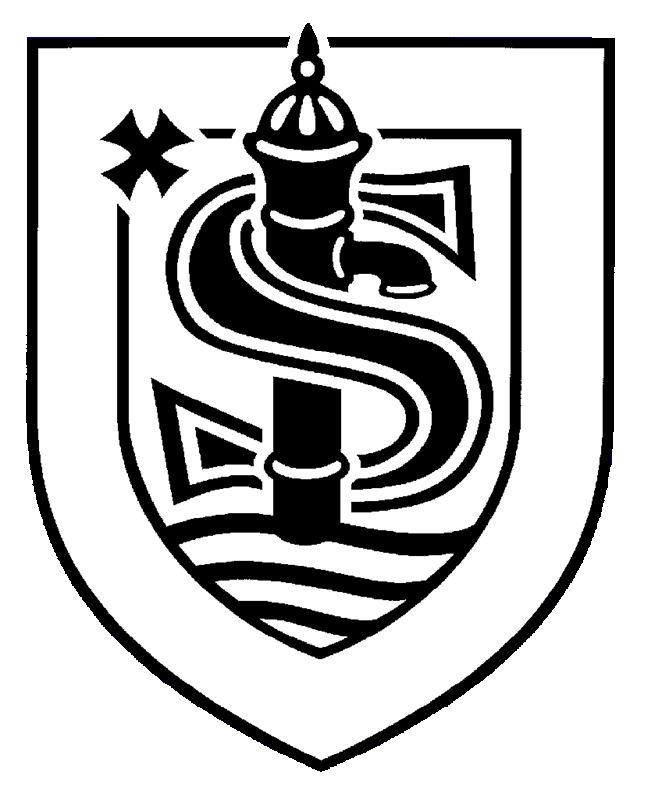English
Introduction
Our aim in English is to develop all aspects of literacy; pupils spoken language, reading, writing and vocabulary thus building a foundation for success in all subjects. Literacy at Spellbrook is exciting, diverse and creative and provides all children with the chance to develop their skills whilst being engaged in their learning. We believe literacy is both a subject in its own right and a medium for teaching. For pupils, understanding of language provides access to the whole curriculum. Reading is a key focus of the school. We strive to ensure that every child can read accurately, fluently and with understanding by the end of key stage 1. A love of reading is promoted throughout the school. We believe that reading is the key to opening up the rest of the broad curriculum and allows children to access and enjoy all other areas of their learning.
Phonics
We follow the Read Write Inc. Phonics programme to teach our 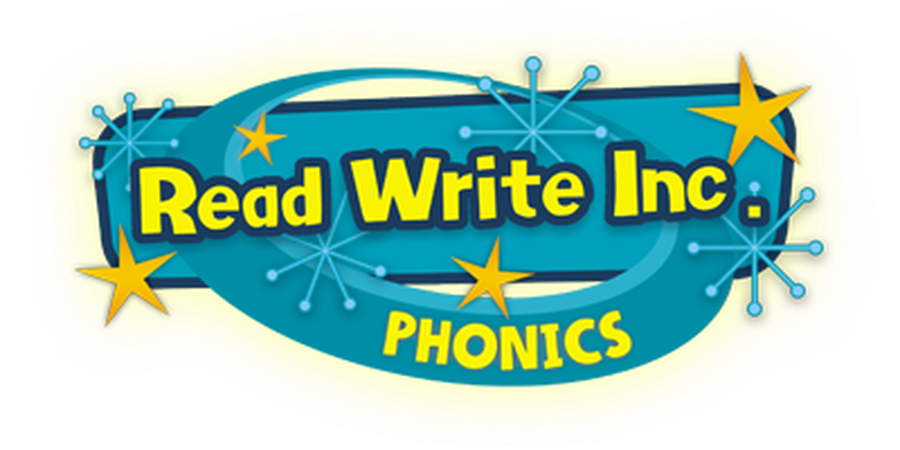 children to read, write and spell.
children to read, write and spell.
The children begin this programme in the Reception Class and earlier where appropriate. Our aim is for every child to read fluently and with understanding by the end of Key Stage 1.
All of our staff have completed the Ruth Miskin Read Write Inc training, we also receive additional development days from a Ruth Miskin Consultancy trainer throughout the year and are working closely with the New Wave English Hub in London which means that we benefit from half termly support days from a literacy specialist. The books that the children take home match the sounds that they are working on at school.
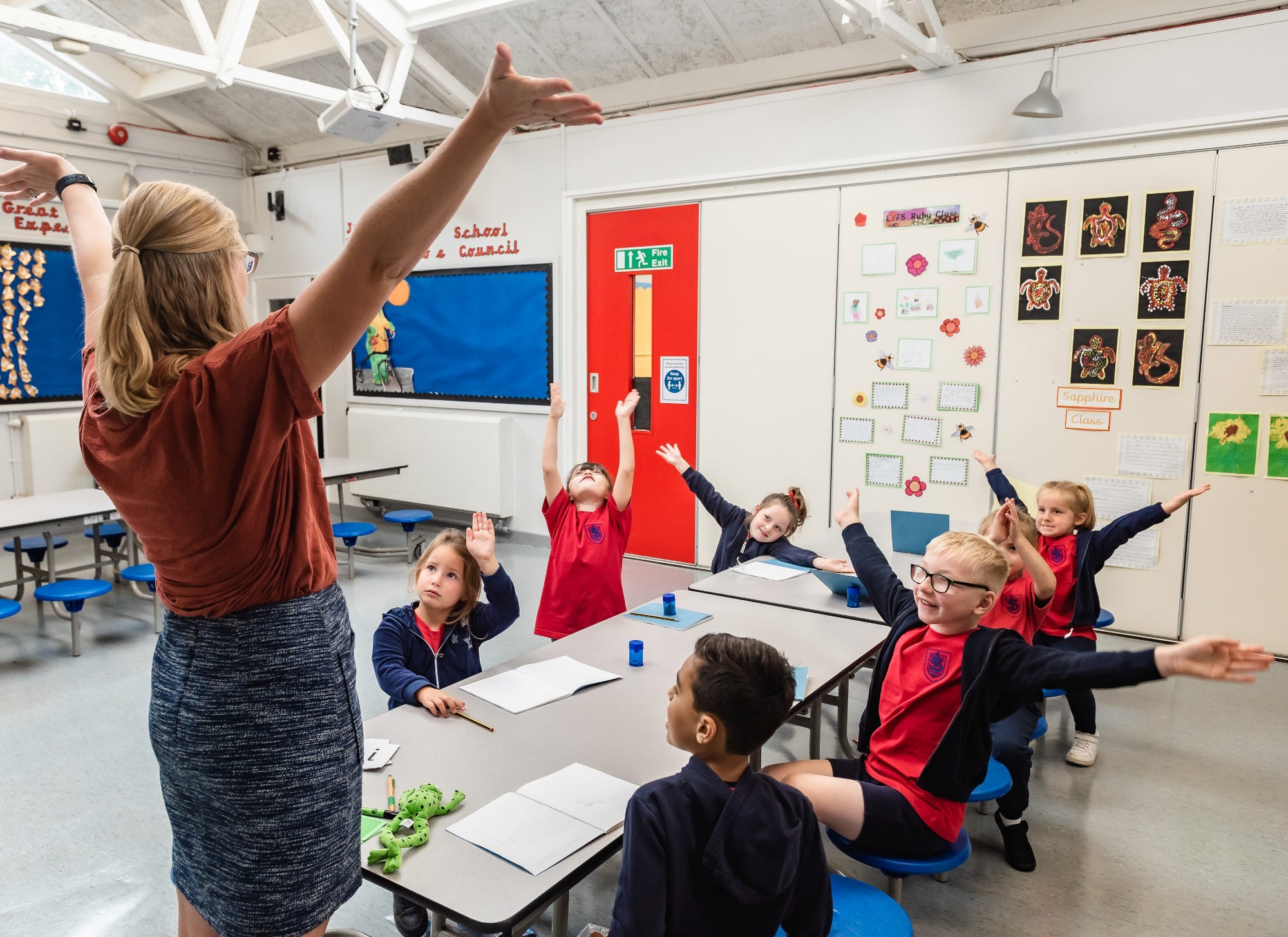
We maximise the number of groups for phonics by using teachers and teaching assistants from across the school so that each group's learning can be carefully targetted, making best use of the progression in the scheme.
We regularity re-assess the children's phonic and reading knowledge and adjust the groups in response to this.
For further information please visit the Ruth Miskin website: https://ruthmiskin.com/en/find-out-more/parents/
Reading
Intent
Broad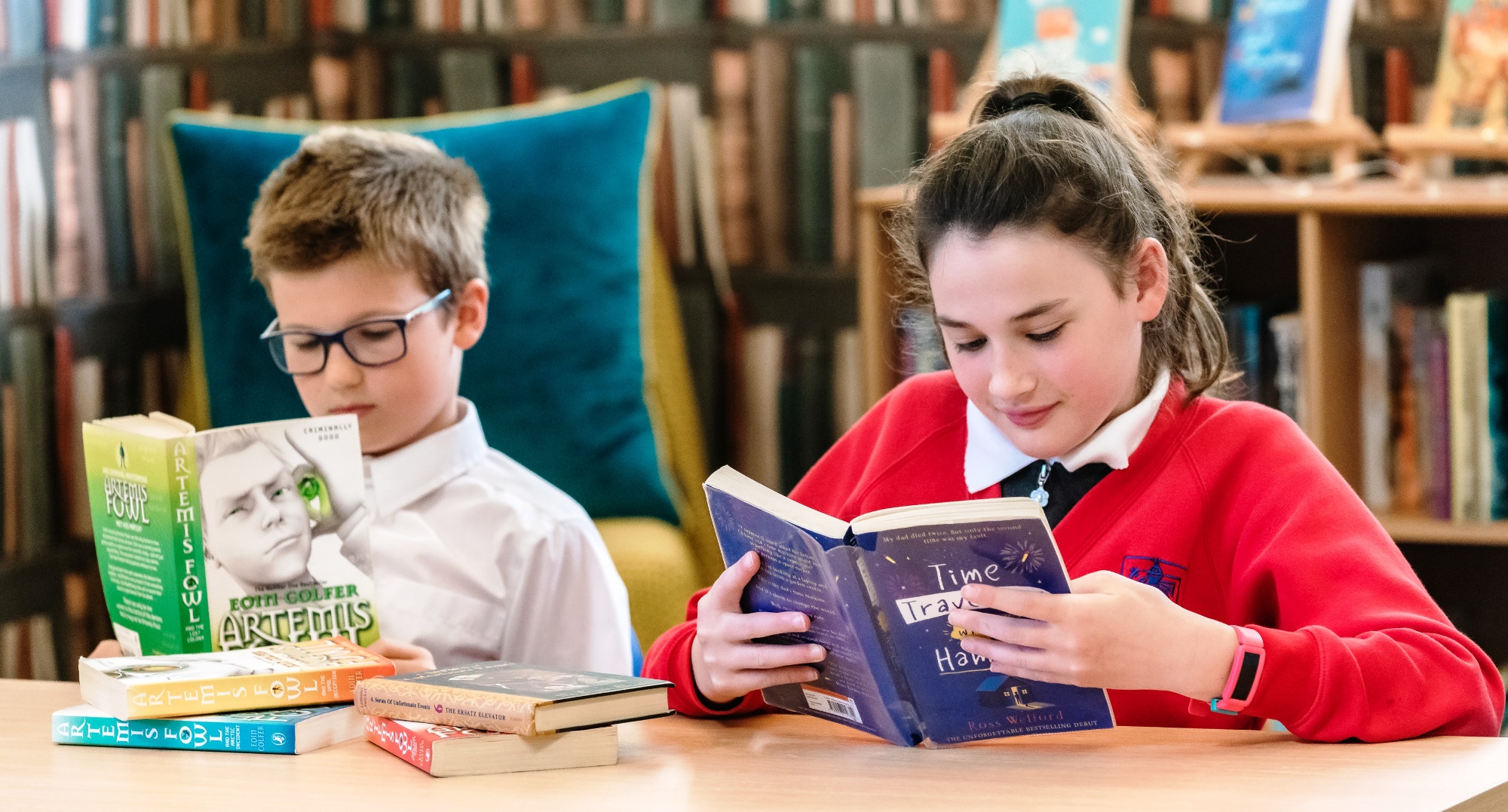
- To develop a love of reading that will continue throughout the children's lives.
- To cover the National Curriculum programmes of study and outcomes.
- Pupils will be taught to speak and write fluently so that they can communicate their ideas and emotions to others, and through their reading and listening, others can communicate with them.
- Through reading in particular, pupils have the chance to develop culturally, emotionally, intellectually, socially and spiritually. Literature, especially, will play a key role in such development. Reading will enable pupils both to acquire knowledge and to build on and make links with what they already know.
- A range of opportunities are provided to enable all pupils to communicate their knowledge and understanding of the subject.
- Links will be made with other subjects in the curriculum to reinforce skills, knowledge and understanding and enhance learning.
- There are a range of opportunities for enrichment experiences such as, visiting authors coming to school and World Book Day to celebrate a love of reading, daily story time, well stocked class libraries containing a range of quality texts and weekly buddy reading time.
- Home reading is of great importance and we encourage parents to work alongside school, providing reading opportunities at home.
Balanced
- Reading is taught daily across the whole school. Early reading begins in EYFS when pupils begin the Read Write Inc. (RWI) scheme which continues daily for all children in KS1. Once the scheme is completed the pupils begin daily whole class reading (WCR) lessons which continue across KS2.
- Opportunities across other curriculum areas will be taken to develop and encourage pupils reading fluency and also expose them to new vocabulary including a range of non-fiction texts and poetry alongside fiction.
- Assembly time could also be used to share reading with pupils, talk about their reading and listen to stories.
Progressive
- RWI is a rigorous, fast-paced and structured synthetics phonics programme designed to get every child reading fast and with confidence. Pupils begin the programme in Year 1 and through half termly assessments pupils will move through the programme which builds on a starting point of single sounds through to incorporating building sentences, explicit vocabulary teaching in context and developing reading fluency.
- Once pupils have completed the RWI programme these skills are then further embedded in whole class reading across KS2 in line with the National Curriculum.
- The whole school reading utilises a structure that enables pupils to develop key reading skills and become progressively sophisticated in their use of comprehension skills.
Cumulative
- Knowledge is revisited and skills developed by repetition and reinforcement in use with other curriculum areas as pupils progress through the school.
- Reading lessons are designed to enable pupils to acquire a rich vocabulary, develop positive attitudes to reading and an ever increasing understanding of what they read. They read and discuss a wide range of non-fiction, poetry, plays and songs. Pupils are given opportunities to increase their familiarity of a wide range of books, including fairy stories, myths and legends including retelling them orally.
Inclusive
- Our reading curriculum is designed so that all pupils are able to read fluently and for pleasure within a broad and balanced curriculum.
- RWI pupils who may require additional support are quickly identified and have additional 1:1 daily interventions specific to their individual needs. Pupils still on the programme in Year 3 continue to be supported in daily RWI lessons and the Fresh Start programme is used in Year 5 and 6 for children who continue to need a high level of support with their reading.
- Those working towards expectations will usually work on the same tasks but may need greater support and may not complete all levels of an activity. Their knowledge and understanding may be demonstrated orally or visually. Where possible, pupils will be supported through paired (partner talk) and group work. Questions posed within sessions provide opportunities for all pupils to be able to contribute.
- The progress of disadvantaged pupils is closely monitored and where needed specific targets will be set to bridge the gap. These are recorded by the class teacher and the impact assessed each half term.
- Pupils working above expectations are expected to undertake activities with greater independence and are encouraged to deepen their answers to show understanding of a greater depth.
- Any child who has Special Educational Needs that impact on their ability to learn to read will have specific support. This will be coordinated by the class teacher and the SENCO and where appropriate will involve the use of specific assessments and interventions. Parents will be kept informed.
Implementation
- Pupils begin the RWI programme in Reception through to the end of KS1. Highly skilled reading teachers and specifically trained teaching assistants implement the RWI programme.
- If pupils complete the programme before the end of KS1 they begin whole class reading which combines elements of the RWI programme.
- Pupils in KS2 will follow the National Curriculum programme of study through daily whole class reading lessons. Planning for this follows the VIPERS acronym: Vocabulary, Infer, Predict, Explain, Retrieve, Summarise.
- A breadth of teaching approaches appropriate to the content and desired learning outcomes are used to engage all pupils and enable them to not just acquire knowledge but to apply it in meaningful contexts.
- Appropriate discussion is recommended as a means of checking pupils’ learning systematically, identifying misconceptions and providing immediate feedback.
- Questions and tasks to stretch and challenge the most able pupils are incorporated.
- Quality resources and materials are provided, including a well stocked reading library in each classroom.
Impact
- The impact is evidenced through the pupils’ use and understanding of the knowledge, skills, concepts and specialist vocabulary.
- Teachers use formative assessment during teaching and learning and provide support as needed so that all children make at least expected progress.
- Pupils are assessed half termly on the RWI programme and groups are adjusted accordingly. The expectation is that pupils make consistent progress through the RWI programme and move through the levels. The bottom 20% in each year group receive specific support and interventions to enable them to increase their progress.
- KS2 pupils undertake a Star Reading Assessment each term. This is an adaptive online reading assessment which measures their reading age and identifies progress. In addition teacher assessment takes into account the degree to which children are reading fluently and with confidence and choosing to read books which engage them in order for them to read for pleasure.
- Children who are behind expectations will be provided support and opportunities to catch up through focussed support during the lesson and in some cases have additional interventions outside of the lesson. This will be identified in targets on their APDR or on the class intervention record.
- The level each child is working at is recorded and input into the school’s tracking system each term and used in the Spring Term for written reports to parents. The level at the end of the academic year provides the receiving teacher with up-to- date information.
- At the end of Reception, reading is assessed as part of the EYFS assessments.
- Children in Year 2 and Year 6 complete SATS in the Summer Term. The outcomes are evaluated as part of the school Self Evaluation process.
Writing
Intent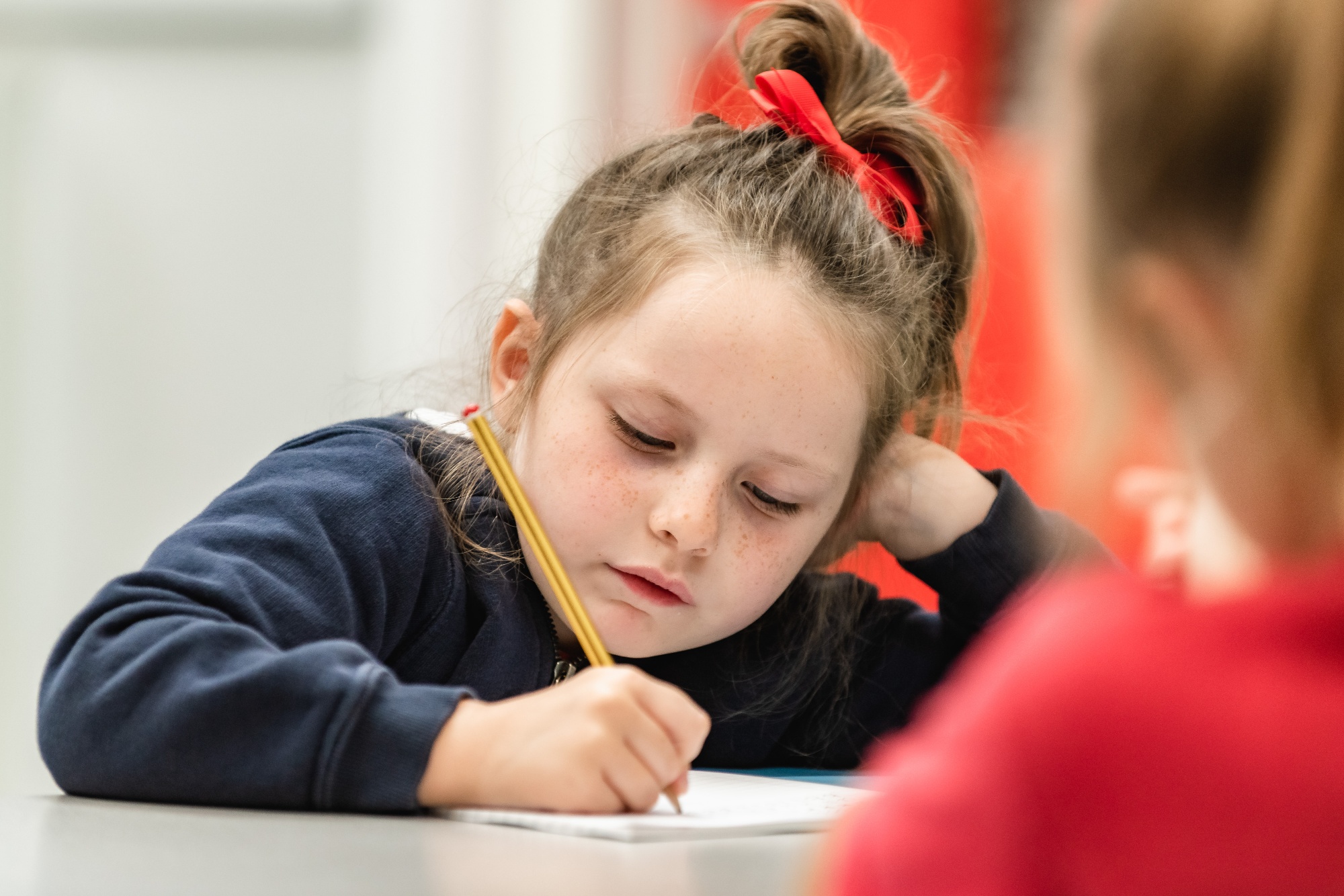
Broad
- To cover the National Curriculum programmes of study and outcomes.
- Pupils will be taught to write fluently so that they can communicate their ideas and emotions to others, and so that others can communicate with them.
- Pupils will be taught to write clearly, accurately and coherently, adapting their language and style in and for a range of contexts, purposes and audiences.
- Pupils will be taught to form fluent, legible and, eventually, speedy handwriting.
- through providing a range of opportunities awe will enable all pupils to communicate their knowledge and understanding of the subject, including grammatical understanding.
- Links will be made with other subjects in the curriculum to reinforce skills, knowledge and understanding. We will promote high expectations of writing within other curriculum areas.
- There are a range of opportunities for enrichment experiences such as writing workshops by authors, BBC Radio 2 ‘500 words’ competition and working with other schools on writing projects.
Balanced
- In Reception, children have a daily phonics session (RWI). This includes being taught to form the letters correctly. In RWI activities children use their developing phonic knowledge to write sounds then to combine these to write words. They use ‘hold a sentence’ to develop an understanding of sentence structure and 'Fred talk' to segment words into their sounds.
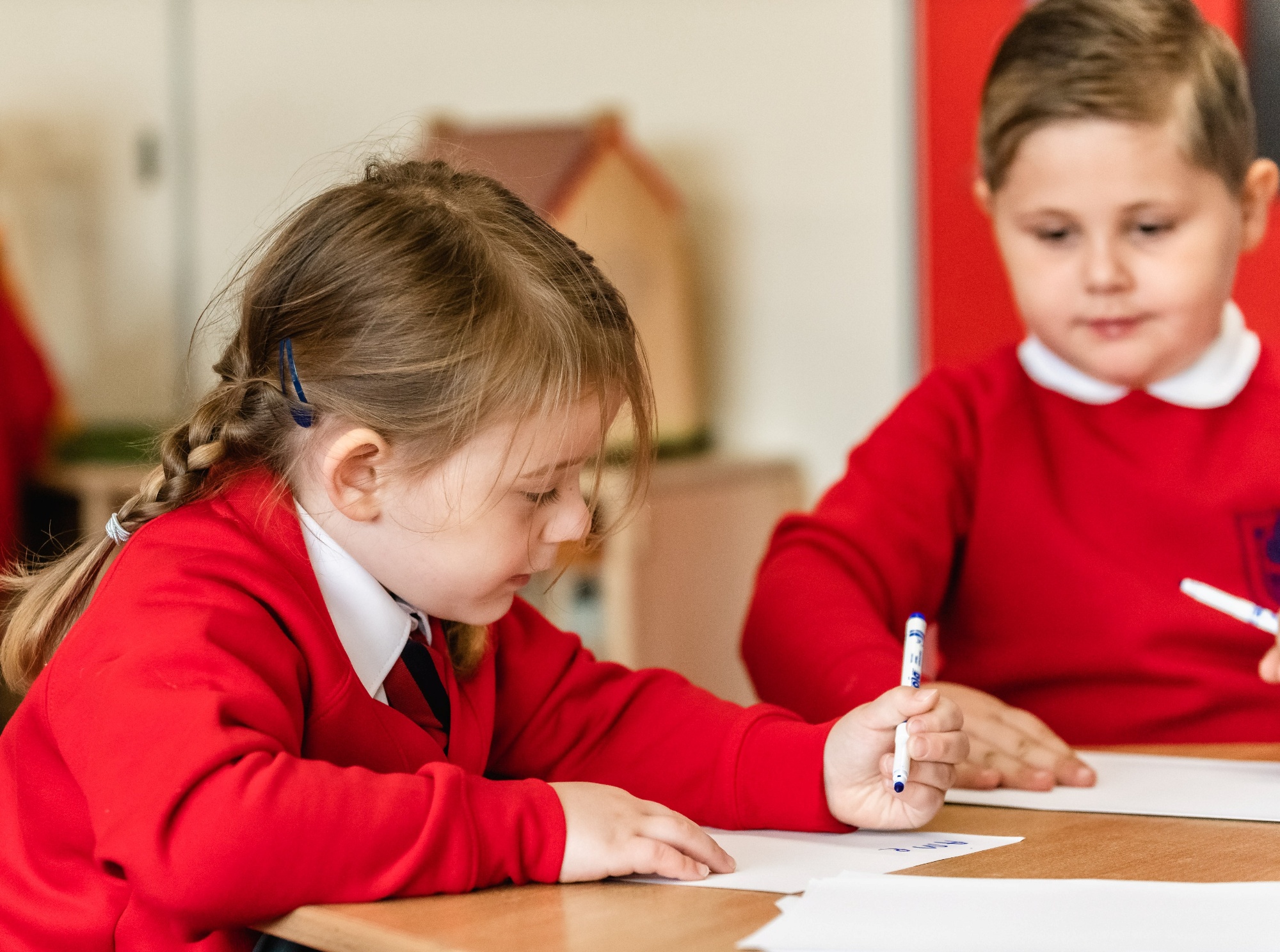
They are also given opportunities through the EYFS curriculum to develop the foundations for writing. Fizzy Fingers, Write dance and other techniques are used to develop the gross and fine motor control needed for fluent writing. Through activities and adult modelling, pupils develop an understanding of the purpose of writing and we aim to inspire children to want to write for their own needs.
- Writing is taught for about an hour a day in KS1 and KS2.
- KS1 have daily writing tasks as part of the RWI programme but also a 45 minute English writing lesson additional to that with KS2 having a one hour writing lesson each day.
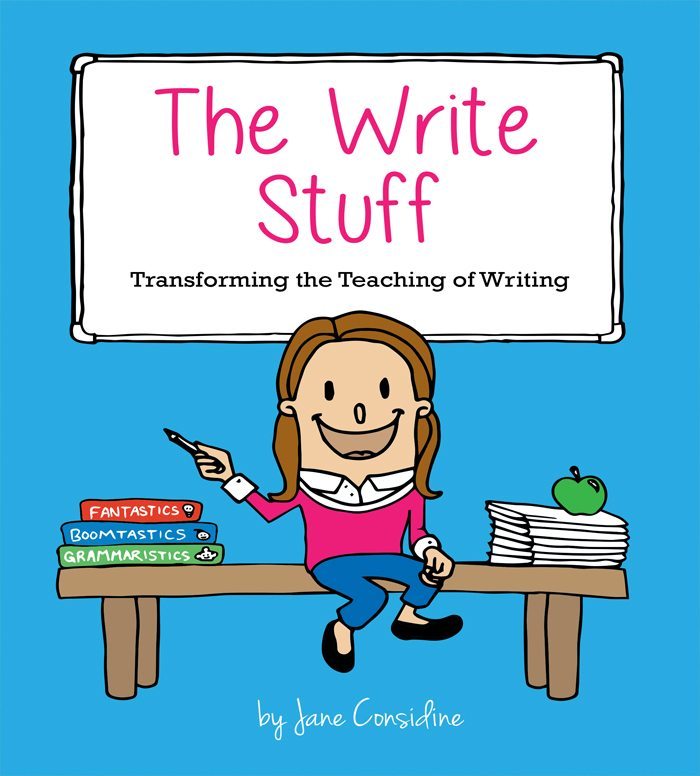
- KS1 and KS2 use ‘The Write Stuff’ approach which utilises a broad range of text types which link to quality texts whilst embedding age appropriate grammatical knowledge and skills alongside it.
- Opportunities across other curriculum areas will be taken to develop e pupils' writing across a range of genres and text types and to develop their competence in transcription and composition.
Progressive
- RWI is a rigorous, fast-paced and structured synthetics phonics programme designed to get every child reading fast and with confidence which the pupils begin in Reception until end of Year 2. The programme develops to include daily writing tasks such as hold a sentence, grammar and vocabulary building opportunities.
- Once pupils have completed the RWI programme, these skills are then further embedded in daily writing lessons in Years 1 and 2 and across KS2 in line with the National Curriculum using ‘The Write Stuff’ units. Throughout KS2 the use of the Writing Lenses enables pupils to progressively develop independence in using a whole range of writing skills and techniques. The progression is shown in the Writing Rainbow.
Cumulative
- Knowledge is revisited and skills developed by repetition and reinforcement in use with other curriculum areas as pupils progress through the school. From EYFS upwards, pupils are encouraged to use talk to develop their thoughts and ideas and to rehearse sentences in preparation for writing.
- Pupils are taught how to plan, revise and evaluate their writing as part of the writing process.
- Writing lessons are designed to enable pupils to acquire a rich vocabulary, develop positive attitudes to writing and an understanding of different skills required when working on a wide range of genres and text types. Pupils are given opportunities to increase their familiarity of a wide range of text types, sentence types and genres often reflecting on prior knowledge to adapt their writing to different contexts.
Inclusive
- RWI is designed as an inclusive programme and we teach in small groups, based on up-to-date assessments. This enables children to be in groups that support them to make progress.
- Our writing curriculum is designed so that all pupils can and should receive their entitlement to be able develop their competence in transcription and composition within a broad and balanced curriculum. The Write Stuff system has the following features that support inclusion:
- clear modelling of the ideas, grammar or techniques of writing.
- the sentence stacking structure that is broken into bite-sized chunks
- a structural framework that provides clarity for all learners
- a highly visual scheme which incorporates writing lenses on a writing rainbow for pupils to use to support their composition.
- use of a range of text types.
- supported writing moving to independent writing on a continued cycle.
- Both RWI and ‘The Write Stuff’ include frequent opportunities for pupils to work together to discuss ideas and feedback as a whole class in their daily lessons. ‘The Write Stuff’ incorporates experience days whereby the children use drama for hot seating, conscience allies and other techniques where they can listen and orally respond.
- Those working towards expectations will usually work on the same tasks but may need greater support and may not complete all levels of an activity.
- The progress of disadvantaged pupils is closely monitored and where needed specific targets will be set to bridge the gap. These are recorded by the class teacher and the impact assessed each half term.
- Pupils working above expectations are expected to undertake activities with greater independence and encouraged to take opportunities to deepen the moment to their show understanding of a range of authorial techniques.
- Any child who has Special Educational Needs that impact on their ability to learn to write will have specific support. This will be coordinated by the class teacher and the SENCO and where appropriate will involve the use of specific assessments and interventions and in some cases the regular use of technology, such as a laptop. Parents will be kept informed.
Implementation
- Pupils begin the RWI programme in Reception through to the end of KS1. Year 1 and 2 pupils have additional daily writing lessons to that and KS2 have daily writing lessons. These are planned using the structure and resources provided within 'The Write Stuff ' system
- A consistent approach and key writing techniques are used to teach writing so that pupils are familiar with the terminology and the desired learning outcomes. This ensures that all pupils are engaged, enabling them enjoy the writing process and know where to start therefore building their confidence.
- Appropriate discussion is recommended as a means of checking pupils’ learning systematically, identifying misconceptions, providing immediate feedback and providing opportunities to share good vocabulary choices.
- The lessons provide tasks that stretch and challenge the most able pupils’ and are incorporated and encouraged where appropriate.
- Teachers often take opportunities to share writing with pupils and classroom boards are used to display a range of pupils writing.
- Quality resources and materials are provided.
Impact
- Teachers use formative assessment during teaching and learning and provide support as needed so that all children make expected progress.
- In EYFS and KS1, writing is assessed as part of the RWI half termly assessments.
- Pupils in KS1 and 2 are assessed termly using the Teacher Assessment Framework (TAF) for each year group.
- Those who are behind expectations will be provided support and opportunities to catch up through focussed support during the lesson and in some cases have additional interventions outside of the lesson. This will be identified in targets on their APDR or on the class intervention record.
- The level each child is working at is recorded and input into the school’s tracking system each term and used in the Spring Term for written reports to parents. The level at the end of the academic year provides the receiving teacher with up-to- date information.
- The phonic skills of children in Year1 are assessed in the Summer Term as part of the national Phonics Screening Check. Any child who is not at the expected level is re-assessed in the Summer Term of Year 2.
- At the end of Reception, writing is assessed as part of the EYFS assessments.
- Children in Year 2 and Year 6 complete SATS in the Summer Term. The outcomes are evaluated as part of the school Self Evaluation process.
